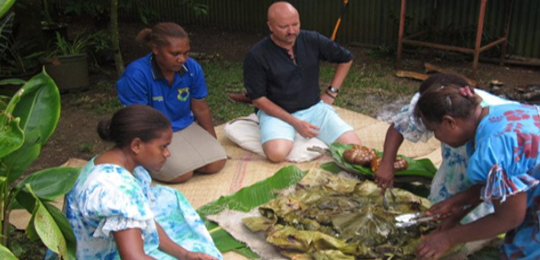March 2019
AGRI-TOURISM EXPERIENCES IN THE PACIFIC ISLANDS

Learning to Cook the Vanuatu way at the boutique family owned Lapita Cafe
Food has always been an important element of experiencing a destination, tours and activities such as farm to table dining, local cooking classes, market tours and street food tours.
Recognizing the increasing demand for these types of experiences, a 2-day Talanoa dialogue recently opened at the Tokatoka Resort in Nadi (27/28 February 2019) by the Pacific Agribusiness Research in Development Initiative (PARDI2) and Pacific Island Farmers Organisation Network (PIFON).
The dialogue focused on identifying opportunities and developing agritourism products to increase the value of tourism to local economies. PIFON’s Lavinia Kaumaitotoya said while farms in the Pacific have various strengths that lend themselves to agritourism experiences, Pacific destinations are not yet well known for culinary journeys or agritourism, ‘There’s an opportunity for farms to promote their communities and cultures, traditions of storytelling and diverse range of crops and traditional agroforests to build agritourism experiences for travellers’.
Existing and new operators in the tourism industry shared their experiences and ideas including Lara Bourke who represented her parents, the directors of Nukubati Private Island (Fiji). She shared with participants at the Talanoa Dialogue that they believed in encouraging their staff to embrace their upbringing, ’It’s about preserving their knowledge of survival and we encourage it because it’s an asset – not a monetary asset but an intellectual asset. It’s information that’s informative and unknown to some, and so therefore extremely interesting’.
The Talanoa Dialogue also addressed the needs and key market research questions of agritourism operators that partners should address over the coming two years. In her presentation, Research Fellow for Pacific Agribusiness Research in Development Initiative (PARDI2), Marita Manley highlighted agritourism experiences including farm tours in Fiji, Vanuatu and Tonga were an undeveloped market, and that there were also not a lot of statistics.
‘Sometimes it’s grouped within nature and eco tours, sometimes it’s not specifically listed as a separate category so it’s difficult to get access to this information but agritourism experiences are aligned to growth sectors in the market so there are opportunities for farmers to diversify their revenue through tourism. Market research is highlighting unique experiences, local experiences, cultural immersion and historical experiences as key growth areas – and quality agritourism experiences tick a lot of these boxes’.
Also at the 2-day Talanoa Dialogue was Chef Lance Seeto who encouraged participants to embrace their environment, culture and cuisine while developing a story around their agritourism product, ‘We’re otherwise another Pacific Island nation – another island with white sandy beaches’.
The dialogue in partnership with the International Finance Corporation (IFC), Australian Centre for International Agricultural Research and Pacific Islands Development Forum brought together a delegation of policy and decision makers, tourism industry experts, academics, and agribusinesses.
IFC’s work in Fiji is guided by the Fiji Partnership. Australia and IFC are working together through the partnership to promote sustainable economic development, reduce poverty and stimulate private sector investment in Fiji.
